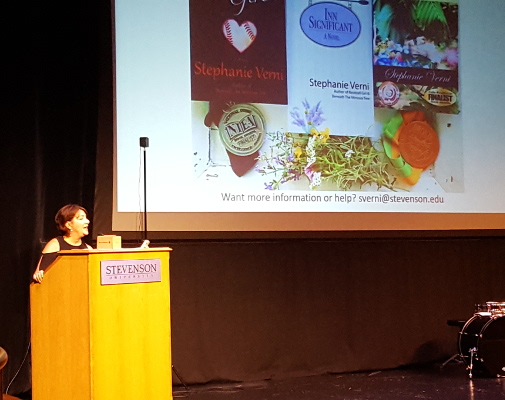
Business Communication professor Stephanie Verni spoke to the faculty and staff at the opening Stevenson meeting about how to begin to give voice and reality to the story inside each of us waiting to be told. This is a transcript of her speech.
____________________________________
I consider myself pretty lucky that I get the opportunity to do two things I love on a daily basis: teach and write. I’m a proud professor here at Stevenson University and also an independent author.
I’m an independent author and write novels for two main reasons: (1) because I believe it’s my duty to show my students that I actually practice what I preach and (2) because it’s an outlet for me and I simply love storytelling.
Since 2012, I’ve self-published three fiction books: Beneath the Mimosa Tree, Baseball Girl, and Inn Significant. I also co-authored one textbook on event planning along with my colleagues Chip Rouse and Leeanne Bell McManus which was published by Kendall-Hunt.
During my 13-year career working for the Baltimore Orioles, I was quite fortunate that my love of writing converged with my career where I served as the director of publishing, was the editor of Orioles magazine, and produced and edited the special book celebrating Cal Ripken breaking Lou Gehrig’s consecutive games streak record in 1995. It was fun to tell Cal’s story.
Which brings me to the question I have for all of you. How many of you have a story in your head or finish a book and think, I could write something better than that?
If you’ve ever had this thought, and if you have a vision and can live in a make-believe world (for fiction) or tell a true story with colorful details (for nonfiction), you can write a book, too.
Today, I’m excited to share my love of novel writing and offer some advice using my own experiences to those of you who have a story swirling inside of you.
#1: First, do write your story. Just begin. My first fiction book, Beneath the Mimosa Tree, started as a short story I wrote while getting my first master’s degree. A professor of mine suggested it should become a novel. It only took me twenty years to write that novel during my MFA program in 2009.
My advice?
Don’t wait 20 years to write your story. Begin now. Just start writing.
#2: Have fun with your characters. The question I’m asked most often at book talks is: How much of the character is you, your family, or your friends? (If you only knew). That’s top secret, but it IS amazing how your friends and family are on their best behavior when they know you are writing. A tip I suggest is to make a list of each of your characters and write down all the things about them: what they like, dislike, look like, say, their dreams, the good and bad of them, etc. It definitely helps when writing.
#3: Enjoy the creativity of writing. Have fun crafting the story, the setting, and plot. Some folks like to outline, and some take a more organic approach. Research the methodology of some of your favorite writers. It’s fascinating to see how one writer’s approach differs from another’s.
#4-When writing, don’t agonize over every word. Do that later during the editing phase, which many of you already know can take longer than you think. It takes me far longer to edit a novel than it does to actually write one.
#5-It may be easier to start with something more personal. For instance, an assignment I give students in my magazine writing class is to write a chapter of their own memoir. Several students have told me that keeping their family histories alive helped them learn to enjoy writing.
#6-Self-publishing takes grit, commitment, and imagination. So why do I choose to self-publish? Because I like owning every step of the process. It sharpens all of my skills: creativity, writing, storytelling, editing, design, and then, the most challenging of all, marketing. As an independent author, it’s all on you. There’s no one to blame and all decisions are yours. It’s fiercely competitive out there, and the odds of massive success are slim. You just have to manage your own expectations.
Some writers may choose to go the agent route or connect with a small press. Do be leery of small presses that want to take your money and have you pay for the start up of your book, sometimes in the neighborhood of $5,000. My start-up costs were minimal. I paid $100 each for the ISBN number for each of my books (a total of $300), then an additional $25 per book for expanded distribution through Amazon. All total it was $375, or $125 per book. That’s it.
#7-Enlist the help of others. When your novel is done, find beta readers who will offer feedback on your draft. Join a writer’s group, either in person or online. Design your own cover or get someone to help you. Ask trustworthy people you know to edit. Chip Rouse over here and my mother, a long-time English teacher, edited my novels. Enter independent author contests. Remember: the project is yours, so you can give to it as much or as little as you like.
#8-Connect with local libraries, media, and the community. They will be good first supporters. In June, I kicked off the summer reading program in Anne Arundel County with a book talk; over the last month, I’ve attended three book clubs for Inn Significant, my latest novel, and I just attended a book signing in Oxford, MD, where the book is set. Enjoy meeting people and networking.
#9-Set up a blog and get a base of readers. Write about your writing, and get personal with your readers. It’s the best way to begin.
And finally,
#10-Remember, writing books is your love and not the way you make your living. While I would love be on the New York Times Bestseller list (who wouldn’t?), there are thousands of us out there hoping for the same thing. I have to remind myself of why I do this sometimes. The other day when I was struggling with new and innovative ways to promote my book, a friend asked me this question: He said, Do you write to sell or do you write to tell a good story?
I write to tell a good story.
If you have a love of storytelling, then just do it. Tell your story. If you make 10 people happy or thousands, remember why you do it in the first place.





